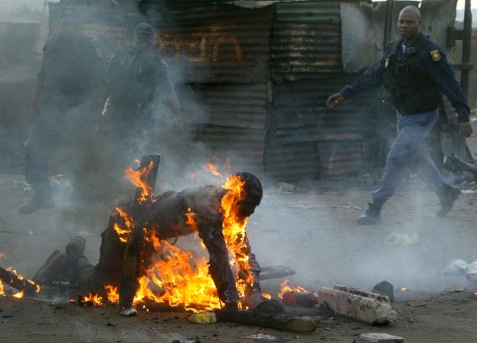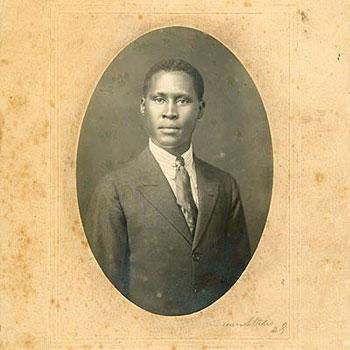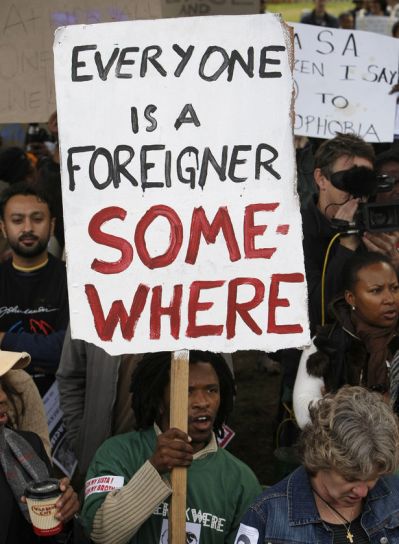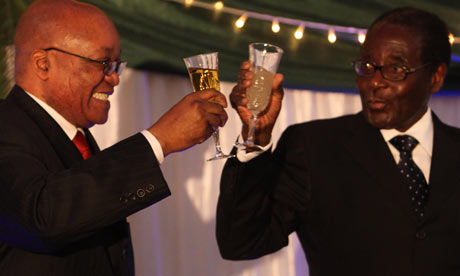Xenophobia is bad.
I would like to think that most people think this. Yet for some strange reason, people are still getting necklaced and or beaten for the heinous crime of being a foreigner in South Africa. It is fair to say such reasoning is fallible at best and utterly superfluous. I am not blessed with the analytical skills let alone the requisite information to debunk the undoubtedly numerous issues that inspire the violent attacks on other human beings. This piece is thus not some learned opinion by a scholarly well-to-do clever black on the 5000 reasons behind the latest spate of xenophobic attacks in South Africa.
Having said that, I believe that if the reasoning behind the attacks is primarily predicated on a dislike of one based on where they are from, such reasoning is very flawed. That reasoning would be grounded on ignorance or denial of a shared history among southern African people that is dangerous in the extreme, and in the case of those who have been killed, fatal.
 I cannot even begin to comprehend the motivation behind burning someone alive. Some would argue that I haven’t had reason to burn someone alive for stealing my job. Perhaps because I am the job stealing foreigner – also I think burning people is illegal.
I cannot even begin to comprehend the motivation behind burning someone alive. Some would argue that I haven’t had reason to burn someone alive for stealing my job. Perhaps because I am the job stealing foreigner – also I think burning people is illegal.
Last week, the South Africa Xenophobia Road Show moved to the hallowed province of KwaZulu Natal. Loads of precautionary WhatsApp chain messages were sent to us makwerekwere[i] warning us of the impending attacks on foreigners, especially in KZN. I am sure those of us who are not fluent in Nguni languages began reciting those all important appendages of the human anatomy that were the true test of one’s South Africanness in 2008; “inqagala, indololwane”. Anyway I digress.
There will probably be a lot of eye rolling, incredulous head shak ing and all the “nc nc nc” and/or “mxims…” in Mzansi for saying that KZN is possibly the symbolic home of black nationalism and arrogance pride in South Africa. How can it not be? It is the home of Shaka, the site of the first defeat of British Imperial forces by Africans at the battle of Isandlwana, the birthplace of the founder of the ANC and first black lawyer, Pixley ka Isaka Seme, the birthplace of ANC progenitor Chief Albert Luthuli (although the truth is he was actually born at Solusi Mission in Zimbabwe), the only province to be named after the dominant ethnic group that makes up its inhabitants. So without a shadow of a doubt, KZN is a pretty important place with important people who did a lot of important things.
ing and all the “nc nc nc” and/or “mxims…” in Mzansi for saying that KZN is possibly the symbolic home of black nationalism and arrogance pride in South Africa. How can it not be? It is the home of Shaka, the site of the first defeat of British Imperial forces by Africans at the battle of Isandlwana, the birthplace of the founder of the ANC and first black lawyer, Pixley ka Isaka Seme, the birthplace of ANC progenitor Chief Albert Luthuli (although the truth is he was actually born at Solusi Mission in Zimbabwe), the only province to be named after the dominant ethnic group that makes up its inhabitants. So without a shadow of a doubt, KZN is a pretty important place with important people who did a lot of important things.
Speaking of important people and important things, Zulu Monarch, Goodwill Zwelithini (the custodian of Zulu culture, traditions and customs), at a gathering under the banner of moral re-generation or something of the sort, said:
“We are requesting those who come from outside to please go back to their countries.”
King Zwelithini’s sentiments were echoed by Edward Zuma, who noted with concern that, “… as a country we are sitting on a ticking time bomb of them (the makwerekwere) taking over the country.” In essence, President Zuma’s son endorsed King Zwelithini’s comments that foreigners needed to go back to their countries. Perhaps Edward has forgotten that he was born in neighbouring Swaziland and that his own sister Gugulethu is married to one of those foreigners. In all probability, Edward low-balled his kwerekwere in-law Wesley Ncube who is married to his younger sister. Is it a surprise then that the xenophobic attacks flared up in KZN in the aftermath of these comments? Again, I don’t know.
 Did the statements give unnecessary fuel to an already volatile issue? Yes. Were there parties who partook in the violence to further their own criminal agendas? Probably. But the statements did not need to be uttered especially in light of the history of what some have rightly called “afrophobia”. In short, those statements, in whatever context they were uttered in, were reckless and irresponsible.
Did the statements give unnecessary fuel to an already volatile issue? Yes. Were there parties who partook in the violence to further their own criminal agendas? Probably. But the statements did not need to be uttered especially in light of the history of what some have rightly called “afrophobia”. In short, those statements, in whatever context they were uttered in, were reckless and irresponsible.
The thing with people
If you tell most people something they will likely believe it. So if South African leaders go around insinuating that joblessness in South Africa is a result of the influx of foreign nationals, then people will believe that joblessness is a result of the influx of foreign nationals. I have seen contrived attempts by some public officials and members of the South African twitter intelligentsia to intellectualise away the afrophobic violence and its roots. In my view, this is very sad and unfortunate especially if one looks at the violence against legal and illegal immigrants whose only crime is possessing (or not possessing) a passport showing a different nationality for what it actually is – murder. I happened to mention on twitter the other day that during the time of umzabalazo, Thabo Mbeki lived in the suburb of Ashdown Park in Harare and probably didn’t get harassed about his nationality, let alone live in fear of being necklaced.
I have adopted the term afrophobia mid way through this piece mostly because it sounds very very smart but more importantly because it is apposite. If you listen to most of the criminals involved in the violence speaking, you would think that Zimbabweans, Malawians Somalis and Mozambicans are the only foreigners in the country. There are no French, English, Dutch, Canadian or Greek foreigners, just African ones. Let’s not forget that every big human being from West Africa is a Nigerian. You rarely hear of attacks on “Nigerians” though. I suppose they fight back (I wonder what Shaka would think of such cowardice reason in the face of a physically imposing enemy).
It is perfectly OK for people to complain of foreigners taking their jobs while collecting their monthly pay slips from Mr Fouché and buying their bread from Fournos or whatever other company is owned, operated and run by foreigners in the strict sense of the word. It is perfectly right and just to burn Mr Omar’s spaza shop and persecute him for having 5 others while there is nothing wrong with the Ackerman family owning ALL the Pick n Pay stores in the country. That kind of logic, in my view is tragically disempowering. Disempowering in the sense that it robs the people who are perpetrating these violent crimes of the ability to see the real problems that have led them to the point where murder, violence and lawlessness have become the legitimate mediums to express frustrations, whether real or imagined with a socio-economic system that has clearly not delivered on promises that accompanied the end of Apartheid.
How mawerekwere are stealing jobs when in many cases they create their own employment by opening little spaza shops is beyond me. But let us not think afrophobia is confined to the less privileged classes. I hear of instances of afrophobia in middle class circles from colleagues who experience it on a daily basis. So it is not necessarily a food in the stomach problem. The fact that it cuts across the class divide probably speaks to a deeper problem.
So we move along swiftly.
Leadership (or lack of) in a time of crisis
 Last week President Mugabe and President Zuma exchanged giggles and laughs, back slaps and high fives in front of an adoring media at the Union Buildings in Pretoria. Somewhere in KZN, (in Isipingo specifically) some one hundred and twenty foreign nationals, some of them Zimbabweans, were attacked by locals and urged to leave the country. Only a month ago, the South African Police Service reported the death of a Zimbabwean woman who was lynched and burnt alive by an angry crowd that wrongly accused her of killing an 8 year old boy. Together with a man who managed to escape the mob, the two had been accused of witchcraft (and also being Zimbabwean). Investigations by the police later revealed that the boy had actually been electrocuted.
Last week President Mugabe and President Zuma exchanged giggles and laughs, back slaps and high fives in front of an adoring media at the Union Buildings in Pretoria. Somewhere in KZN, (in Isipingo specifically) some one hundred and twenty foreign nationals, some of them Zimbabweans, were attacked by locals and urged to leave the country. Only a month ago, the South African Police Service reported the death of a Zimbabwean woman who was lynched and burnt alive by an angry crowd that wrongly accused her of killing an 8 year old boy. Together with a man who managed to escape the mob, the two had been accused of witchcraft (and also being Zimbabwean). Investigations by the police later revealed that the boy had actually been electrocuted.
Did our leaders show concern over this violence? No. What we got from President Mugabe was a statement of gratitude towards the South African government and its people for accommodating Zimbabweans for so long, many of whom are undocumented. He apologised to the South African people for Zimbabweans “offending their systems”. One cannot help but liken these statements to the one made by our leader regarding the Gukurahundi massacre – yes I am on about that again.
Human rights activist, Elinor Sisulu, commenting on the bilateral talks between the two leaders summed it up perfectly when she said:
“They don’t deal with the shit. They talk about things which have no relevance to people,”
In my view, this story of violence on Africans by Africans is one of the greatest tragedies of our time. No one interrogates the real reasons why we are here. Why people risk life and limb to cross a crocodile infested Limpopo River. Perhaps millennia from now, those that come after us will look back at what is undoubtedly an unfortunate epoch in Zimbabwe-South African relations. A time characterised by senseless violence that robs us of the ability to sift through the bullshit and get to the issues that are really plaguing our development as individuals, communities and nations. Some wise people have said that the moral arch of the universe is long but eventually bends towards justice. Perhaps it is time to forcefully bend that moral arch so that we can all see the humanity in each other.
[i] Derogatory term used to refer to foreigners in South Africa
Eleph Gula-Ndebele



That is an articulate analysis of the ‘afrophobia’ that’s going on in S.A Eleph. Well done mate keep up the good work. I’ll share with some good friends here.
LikeLike
An interesting article from young Gula-Ndebele. I enjoyed the matter of factness in which the issue was tackled. Unfortunately its all too often that we are writing and reading about the tragic life of Africans. Our problems sometimes almost seem insurmountable particularly when they are so unnecessary and shockingly idiotic as the xenophobic violence in SA is. To me this is just another symptom of what the real problem is with Africa, and I dare say in a broader sense with black people. That is the problem of responsibility. As Africans we fail to understand and assume our individual and collective responsibility and that is why things like the xenophobia occur. We all too often delegate our individual responsibility of ensuring that first of all we individually create and live the lives we want because no one else will do it for you. If you want food, water, and shelter you must make sure that the necessary building blocks for you to get those things are there. Most Africans believe that the responsibility for availing those requirements of life rests with other people particularly politicians. Unfortunately, if we all believe it is someone else’s responsibility, it soon becomes no one’s responsibility hence the unnecessary shortage of all three in Africa. Exercising individual responsibility does not mean you must go foraging for food or dig wells to get water, it means you must ensure that whoever is tasked with delivering such basic requirements does so with zero compromise. If they fail to do so then they must be removed by any means necessary whilst maintaining law and order. Collective responsibilty requires that every individual have an interest in the success of the community and play their part without selfish considerations. The problem in Africa is that almost all the sections of our society do not carry out their responsibilities so collectively we have become an irresponsible continent. We are irresponsible enough to collectively allow largely incompetent and useless leaders to assume office as presidents, ministers, MPs, bankers, business leaders, church leaders and even “prophets”. you hear there are no jobs and people start to get killed. We as Africans have been made to believe that these incompetent leaders are a way of life and that we as Africans have no power to remove them or make them carry out their responsibilities, but that can not be true because they are human after all. Collective responsibility means that we must put in place and manage institutions, whether political, financial, social or even religious that will focus exclusively on the success of our society and that if such institutions do not carry out their responsibilty then they must be discarded by any means necessary while mainting law and order. Those who liberated Africa understood and carried out their individual and collective responsibility that is why South Africans fighting apartheid like Mbeki, Zuma were accomodated by other Africans who were just carrying out their responsibility. If we carry out our individual and collective responsibilities, we will never again hear of xenophobia or Afrophobia as it has been more aptly named.
LikeLike
As always Eleph a very illuminating article.
What’s being ‘allowed’ to happen in SA is because the leadership has abdicated responsibility of delivering social services to their citizens so many years after independence promises. So it’s easier to perpetuate this myth that ‘their hands are tied’ and it’s the fault of these bad foreigners why things are not working for the citizens. And unfortunately it seems it’s only the black foreigners who are a cause of their misery. I believe that SAPS would no doubt stop such attacks even before they began had ‘productive whote folks’ been attacked. We saw how quick they were to protoct the mine owners during Marikana, they killed their own citizens for trying to mess with the white mans money & South Africans themselves haven’t tried to go up against the elite again.
There is nowhere in the work right now where citizens aren’t feelibg the love for immigrants but Africa is the only place where they go as far as killing them. I envision some
White folks somewhere over a glass of whisky complaining about the white mans burden, just when we thought we had civilized these people they prove to the world that they are still savages. Cry the beloved country.
LikeLike